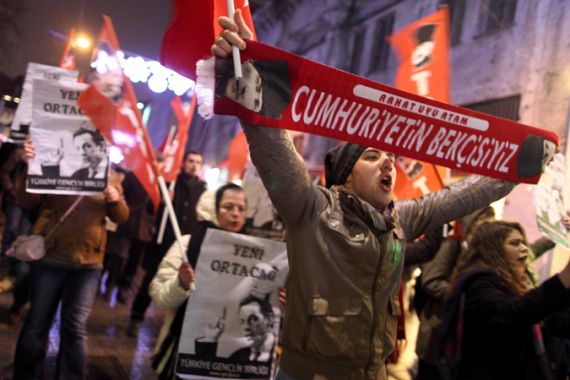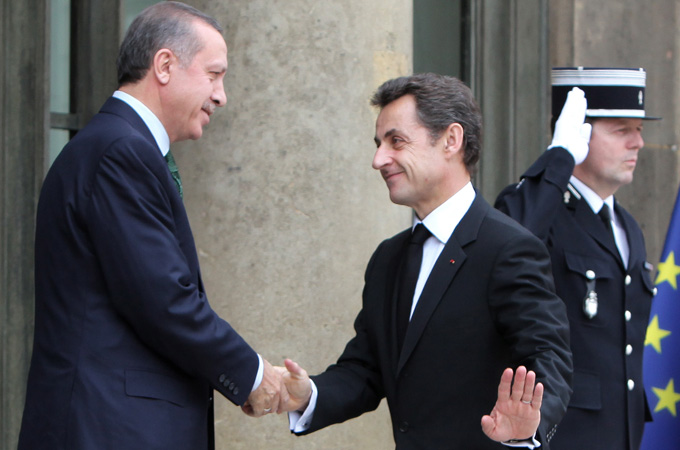French ‘genocide’ law infuriates Turkey
A new French law recognising the mass killing of Armenians as a genocide further strains ties between Ankara and Paris.

 |
| Erdogan, left, accused France of seeing ‘oil [and] gold mines … when they look in [Libya’s] direction’ [EPA] |
Relations between France and Turkey have reached breaking point after the French senate approved a bill that outlaws denying that the mass killings of Armenians by Ottoman Turks in 1915 constituted genocide.
Turkey, which sees such allegations as a threat to its national honour, has already suspended military, economic and political ties with France.
It has also said it will bring sanctions against France over the law, although the nature of those sanctions remains unclear.
However, according the the AFP news agency, trade between the two countries was worth $15.5bn in 2010, with a significant number of French firms operating in Turkey, which also has a number of defence contracts with France, including a purchase order for air defence missiles.
A report submitted to the French parliament indicates France sold more than $260m in weapons to Turkey between 2006 and 2010,
Helen Drake, senior lecturer in French and European Studies at UK’s Loughborough University, said: “The response [from Turkey] will be rhetorically robust, but diplomacy behind the scenes will continue as usual.”
She added that while Turkey is an important ally to France, it is neither a top trading partner nor “a friend as such, so relations will remain tense”.
Turkey’s foreign ministry issued a statement on Tuesday, saying the law should not be finalised to “avoid this being recorded as part of France’s political, legal and moral mistakes”.
Meanwhile, critics have called the move a ploy by French President Nicolas Sarkozy to garner votes from about 500,000 Armenians in upcoming spring elections.
French ‘dictation’
Armenia says that planned massacres and deportations left more than 1.5 million of its people dead between 1915 and 1923, while Turkey disputes those figures, officially stating the number to be closer to 500,000.
It also vehemently rejects that Armenians were killed as a means of ethnic cleansing, maintaining that the casualties occurred as a result of the Russian invasion and World War I.
“No Turk I have come across objects that there occurred Armenian massacres during the First World War,” said Birol Baskan, a visiting professor at Georgetown University’s School of Foreign Service in Qatar.
“They object to naming the massacres as a genocide. I do not see that they are going to succumb to any dictation of any sort to describe the massacres as a genocide in the future.
“So, what might France’s move change? Basically, nothing. It just further angered the Turks – that’s all.”
The genocide bill is only the latest issue to hit the already damaged relationship between teh two nations.
“Turkey sees France as a trouble maker in the Middle East,” said Baskan.
“This became so clear in the Libyan crisis. Erdogan implicitly accusedFrance of caring just about oil and escalating the crisis in Libya.
“Also there is the Sarkozy factor – he is obviously against Turkey’s accession to the EU and undiplomatically expresses his opposition.”
Baskan added that Turkey’s response to France has been “long in the making” and “just waiting for the right moment to explode.
There have been numerous snubs, including the fact that Sarkzoy has visited Turkey only once during his presidency, staying onlyfor a few hours.
Drake says Paris’ stance is not based on Islamophobia “but to do with French ambitions in, and for, the EU” – to increase the influence of France in the EU and to lessen Turkey’s influence in the region.
Political ping-pong
The International Association of Genocide Scholars has recognised the mass killing of Armenians as a genocide since 1997, condemning the Turkish government’s denial.
While France is in the process of criminalising the denial of genocide, Turkey has long punished those who acknowledge the killings as a genocide, jailing many activists and academics.
In 2007, a Turkish court dismissed any link between the state, or any nationalist movement, and the 2007 murder of Armenian rights activist and journalist Hrant Dink.
The editor of a Turkish Armenian newspaper, Dink wrote about the Armenian genocide and was charged repeatedly under a Turkish law banning “insults to Turkishness”.
He was shot on a street in Istanbul by a young man who claimed to have been offended by Dink’s work.
Domestic consumption
Critics say both Sarkozy and Erdogan are taking a hardline over the genocide question with a view to gaining support at home.
Halil Karaveli, a Turkey analyst and a senior fellow at the Central Asia-Caucasus Institute, said: “This way of handling historical matters, using them as political material like that, is very inappropriate, and it’s also very apparent that the French President Sarkzoy, is making an investment in his elections campaign.
|
|
“Something that is against Turkey will pay off in France because it caters to emotions or currents in France that aren’t particularly appealing.”
Karaveli also points out that a strong, nationalistic response from Erdogan is also sure to “pay off, politically”.
Erdogan called the impending French law “a racist and discriminatory approach and if you cannot see this, then you are deaf to the footsteps of fascism in Europe.”
In addition to forcing nationalist parties in each country to get further locked into their entrenched positions, Karaveli said the biggest issue with this political game is that the very point of them is lost.
“What happens is that you lose sight of the issue – what happened to the Armenians and the need for Turkey to address that historical tragedy,” said Karaveli.
Denial ‘an insult’
Alexis Govciyan, the president of the National Council of Armenians in France, welcomes the law, saying that it took a lot of effort to counter Turkish pressures against the measure.
“Of course, this not a law against Turkish people. In the civil society there are a lot of good people dealing with this issue – the only problem we have is that the Turkish government has taken a position of denial against the Armenian genocide,” said Govciyan.
“We think it’s really insulting to us – the Armenian people and the Armenian identity – when we see the attitude of the Turkish government.
“When you have this in your history, in your memory, when you still have a country or government telling you it was not [a genocide] … you have to put yourself in the place of these people who experienced a crime against humanity.”
Govciyan does not think that the new law will worsen the situation for the 50,000 or so Armenians currently living in Turkey, where Armenian rights activists, intellectuals, and even the journalists who write about them, are often arrested.
A recent high-profile case is that of publisher Ragip Zaraklou, who was arrested after publishing controversial books, including several Armenian titles, including ones on the topic of the genocide.
Zaraklou was tried and jailed under the country’s anti-terrorism laws.
Still, Govciyan said that the point of the law is not to vilify the Turkish people – in fact, he feels that if the government were to label the killings as a genocide, Turkish people might be able to move on.
“Turkish people, today, it’s not their fault what happened in 1915. So if the government recognises this [genocide] it would also be very helpful for the Turkish people.”
This, however, seems unlikely to happen.
The US flip-flop
France is not the only country to incur Turkish wrath over recognising the mass killing of Armenians as genocide.
President George W Bush told the House Foreign Affairs Committee in 2007 that any such bills’ “passage would do great harm to our relations with a key ally in NATO and in the global war on terror”.
The US has come close to passing similar resolutions several times in the past, only to back away from the brink following high-pressure campaigns from the Turkish lobby, and members of Congress, who felt that passing such a bill would compromise national security interests.
At that time, US military cargo passed through Turkey which had threatened to attack Iraqi Kurds, causing further instability in Iraq.
During his presidential campaign, US President Barack Obama said that: “America deserves a leader who speaks truthfully about the Armenian genocide”, but once in office, his administration opposed a resolution to recognise the killings as genocide in 2010.
According to records kept by the Washington-based International Affirmation of the Armenian Genocide, as of May 2011, 43 US states recognised the Armenian genocide, with Alabama, Indiana, Mississippi, Iowa, Wyoming, South Dakota and West Virginia being the hold-outs.
More than 20 countries around the world recognise what was done to the Armenians as genocide, including Belgium, the Netherlands, Sweden, Germany and Switzerland, although they have not made the denial of a genocide a crime.
The Iran exception
Despite Turkey saying it would join a recent EU oil embargo against Iran (while criticising the bloc’s decision to implement the ban in the first place), Ankara enjoys relatively decent diplomatic ties with its neighbour to the north.
This is particularly odd given that so many Armenians escaped to Iran, where they built the Armenian Genocide Museum and Memorial on the grounds of the iconic Vank Cathedral in Isafan.
And Turkey, for its part, has strengthened its ties with NATO, allowing for an anti-missile shield within its borders.
Indeed, Karaveli insists that the dust-up with France will in no way compromise Turkey’s geopolitical strength in the region, and said the relationship between Turkey and Iran has long been a complicated one of rivals and allies.
But Iran is not the only country in the region that manages to avoid raising Turkish ire on the topic.
“For that matter, the Arabs by and large also describe the massacres as a genocide, but neither the Arab nor Iranian stance seem to be disturbing for the Turks,” said Baskan.
“Two factors might explain this. First, as long as an official declaration is not issued by Iran and Arab states, that’s OK for the Turks.
“Second, the European or American declaration particularly angers the Turks, for the Turks generally believe that the Europeans and Americans have committed much worse crimes in the past, but they forget those crimes [and] do not let anyone talk about them.
“But [the French] turn the attention to what the others have done.”
It is doubtful that Turkey will grant France an exemption any time soon, and France appears to have dug in its heels on the issue.